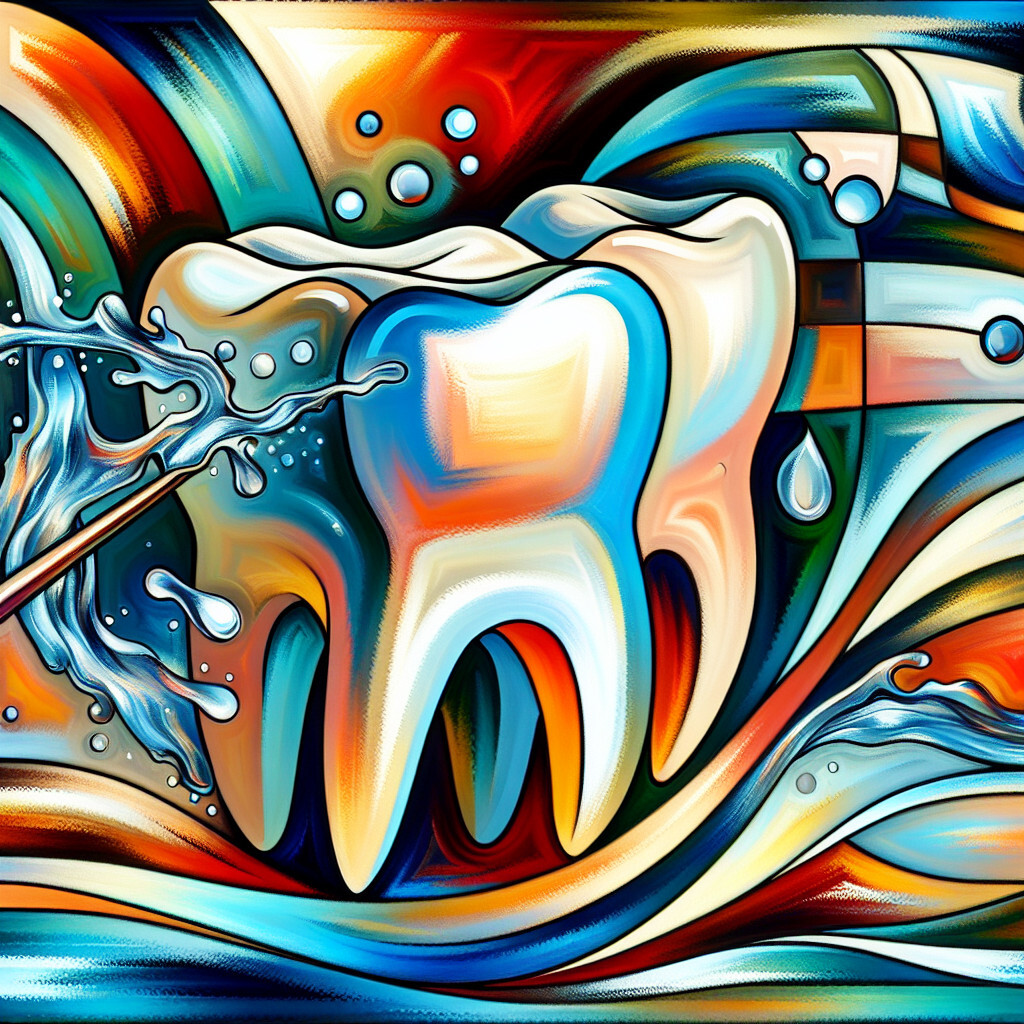-
Table of Contents
“Mineral Water: A Splash of Health for Your Smile!”
Introduction

Mineral water, often consumed for its perceived health benefits, can have varying effects on dental health. The impact on teeth largely depends on the mineral content and pH level of the water. While some minerals like calcium and fluoride can strengthen teeth and protect against decay, others like carbonic acid in sparkling mineral water can potentially erode tooth enamel. Therefore, understanding the effects of mineral water on teeth is crucial for maintaining oral health.
Understanding the Impact of Mineral Water on Dental Health
Mineral water, a popular beverage choice for many, is often lauded for its health benefits. It is rich in essential minerals like calcium, magnesium, and potassium, which are known to promote overall health. However, when it comes to dental health, the impact of mineral water is a topic that warrants a closer look.
Mineral water, particularly the sparkling variety, has been under scrutiny for its potential effects on dental health. The concern primarily stems from its acidity levels. Sparkling mineral water is carbonated, and the process of carbonation can lower the pH level of the water, making it more acidic. Acidic foods and beverages are known to contribute to tooth erosion, a condition where the hard, outer layer of the teeth, known as enamel, wears away. This can lead to sensitivity, discoloration, and an increased risk of cavities and tooth decay.
However, it’s important to note that the acidity level in sparkling mineral water is significantly lower than in other beverages like soft drinks and fruit juices. Therefore, while it is more acidic than still water, the risk it poses to dental health is considerably less than these other more acidic beverages.
On the other hand, the minerals found in mineral water can have a positive impact on dental health. Calcium, for instance, is crucial for strong teeth and bones. It helps to neutralize acids in the mouth, reducing the risk of tooth decay. Similarly, magnesium also plays a vital role in forming hard enamel that resists decay. Therefore, drinking mineral water can contribute to the intake of these essential minerals, promoting dental health.
However, it’s worth mentioning that while mineral water can contribute to your daily mineral intake, it should not be relied upon as the sole source. A balanced diet rich in fruits, vegetables, dairy products, and lean proteins is necessary to meet the recommended daily intake of these essential minerals.
Furthermore, the impact of mineral water on dental health can also depend on other factors such as oral hygiene practices and the overall health of the individual. Regular brushing and flossing, along with routine dental check-ups, are crucial in maintaining good dental health. Individuals with existing dental issues may also need to be more cautious with their consumption of acidic foods and beverages, including sparkling mineral water.
In conclusion, while sparkling mineral water is slightly more acidic than still water, its impact on dental health is less detrimental compared to other more acidic beverages. The minerals found in mineral water can contribute positively to dental health, but they should not replace a balanced diet or good oral hygiene practices. As with most things, moderation is key. If you enjoy drinking mineral water, particularly the sparkling variety, it’s best to consume it in moderation and as part of a balanced diet. Regular dental check-ups and good oral hygiene practices will also go a long way in ensuring your teeth stay healthy.
The Role of Mineral Water in Preventing Tooth Decay
Mineral water, a popular beverage choice for many, is often lauded for its health benefits. It is rich in essential minerals like calcium, magnesium, and potassium, which are vital for our overall health. However, one aspect of mineral water that is often overlooked is its potential role in preventing tooth decay. This article aims to shed light on this lesser-known benefit of mineral water.
Tooth decay, also known as dental caries, is a common oral health problem that affects people of all ages. It occurs when the bacteria in the mouth convert sugars from the food we eat into acids, which then attack the tooth enamel, leading to decay. Over time, this can lead to cavities, toothache, and even tooth loss if left untreated. Therefore, maintaining good oral hygiene and adopting preventive measures is crucial to keep tooth decay at bay.
One such preventive measure could be the regular consumption of mineral water. The minerals found in this type of water, particularly calcium and phosphate, are known to play a significant role in maintaining oral health. Calcium is a key component of our teeth and bones. It strengthens the tooth enamel, the outermost layer of the tooth, making it more resistant to acid attacks and decay. On the other hand, phosphate works in tandem with calcium, enhancing its effectiveness in strengthening the tooth enamel.
Moreover, mineral water is typically alkaline due to the presence of minerals like calcium and magnesium. This alkalinity helps neutralize the acidity in the mouth, thereby reducing the risk of tooth decay. It is worth noting that a lower pH in the mouth creates a conducive environment for the bacteria to thrive and produce acids, leading to tooth decay. Therefore, by helping maintain a balanced pH, mineral water can indirectly contribute to preventing tooth decay.
In addition to this, drinking mineral water stimulates saliva production. Saliva plays a crucial role in oral health as it washes away food particles and neutralizes acids, thereby protecting the teeth from decay. Furthermore, saliva is also rich in calcium and phosphate ions, which can help remineralize the tooth enamel, further enhancing its resistance to decay.
However, while mineral water can contribute to oral health, it should not be considered a standalone solution for preventing tooth decay. It is essential to remember that maintaining good oral hygiene practices, such as regular brushing and flossing, is paramount. Regular dental check-ups are also crucial for early detection and treatment of any oral health issues.
Moreover, it is important to note that not all mineral waters are created equal. Some may contain added sugars or artificial flavors, which can increase the risk of tooth decay. Therefore, when choosing mineral water, it is advisable to opt for natural, unflavored varieties and to check the label for any added ingredients.
In conclusion, mineral water, with its rich mineral content and alkaline nature, can play a supportive role in preventing tooth decay. However, it should be part of a broader oral health strategy that includes good hygiene practices and regular dental check-ups. So, the next time you reach for a beverage, consider choosing mineral water – your teeth may thank you for it.
Mineral Water: A Secret Weapon for Stronger Teeth
Mineral water, often seen as a refreshing and healthier alternative to sugary drinks, has been gaining popularity over the years. However, beyond its thirst-quenching properties and zero-calorie appeal, mineral water holds a secret weapon for stronger teeth. This seemingly ordinary beverage is packed with minerals that can significantly contribute to oral health, making it a worthy addition to your dental care routine.
The primary reason mineral water is beneficial for teeth lies in its rich mineral content. It contains calcium and phosphate, two minerals that are essential for maintaining the strength and integrity of our teeth. Calcium is a crucial component of our teeth, making up a significant portion of their structure. It helps to harden the enamel, the outermost layer of the teeth, protecting them from decay and erosion. Phosphate, on the other hand, works in tandem with calcium, enhancing its effectiveness in strengthening teeth and preventing cavities.
Moreover, mineral water is often a source of fluoride, a mineral known for its protective effects on teeth. Fluoride has been widely recognized by dental professionals for its ability to prevent tooth decay. It achieves this by making the tooth more resistant to acid attacks from bacteria in the mouth and sugars in the diet. Additionally, fluoride can reverse early decay by promoting the remineralization of enamel, replacing the minerals lost to acid attacks and strengthening the tooth structure.
The benefits of mineral water for oral health extend beyond its mineral content. Its lack of sugar and artificial sweeteners makes it a tooth-friendly choice compared to other beverages. Consuming sugary drinks can lead to tooth decay as the sugar feeds the bacteria in the mouth, producing acids that erode the tooth enamel. By choosing mineral water, you avoid this risk, promoting a healthier oral environment.
Furthermore, the act of drinking water itself is beneficial for oral health. Water helps to cleanse the mouth, washing away food particles and diluting acids produced by bacteria. This reduces the risk of tooth decay and gum disease. Drinking water also stimulates saliva production, which plays a crucial role in maintaining oral health. Saliva not only helps to wash away food particles but also neutralizes acids and provides minerals for the remineralization of teeth.
However, it’s important to note that while mineral water is beneficial for oral health, it should not replace regular dental care practices. Brushing twice a day with a fluoride toothpaste, flossing daily, and regular dental check-ups are still essential for maintaining good oral health. Mineral water should be seen as a supplement to these practices, providing additional minerals and promoting a healthier oral environment.
In conclusion, mineral water, with its rich mineral content and absence of harmful sugars, is a secret weapon for stronger teeth. Its consumption can contribute to the prevention of tooth decay and the strengthening of tooth enamel. However, it should be used in conjunction with regular dental care practices for optimal oral health. So, the next time you reach for a beverage, consider choosing mineral water. Not only will it quench your thirst, but it will also give your teeth a mineral boost, contributing to a healthier, stronger smile.
Exploring the Benefits and Risks of Mineral Water on Teeth
Mineral water, a popular beverage choice for many, is often lauded for its health benefits. It is rich in essential minerals like calcium, magnesium, and potassium, which are known to promote overall health. However, when it comes to oral health, particularly the impact of mineral water on teeth, the discussion becomes more nuanced. It is essential to explore both the benefits and potential risks associated with the consumption of mineral water to make informed decisions about our dietary choices.
One of the primary benefits of mineral water for teeth lies in its calcium content. Calcium is a vital mineral for maintaining the strength and integrity of teeth and bones. Regular consumption of mineral water can contribute to the daily calcium intake, thereby promoting dental health. Moreover, mineral water is a healthier alternative to sugary drinks and sodas, which are notorious for causing tooth decay and cavities. By choosing mineral water over these harmful beverages, one can significantly reduce the risk of dental issues.
Another advantage of mineral water is its alkaline nature due to the presence of minerals like potassium and magnesium. This alkalinity can help neutralize the acidity in the mouth, which is often the cause of tooth erosion and decay. Furthermore, some studies suggest that the magnesium in mineral water can aid in the formation of enamel, the hard, protective outer layer of the teeth. This can further enhance the resistance of teeth against decay and damage.
Despite these benefits, it is crucial to note that not all mineral waters are created equal. Some brands of mineral water contain added carbonation, which can pose potential risks to dental health. Carbonated mineral water is more acidic than its non-carbonated counterpart. This acidity can lead to the erosion of tooth enamel over time, making the teeth more susceptible to cavities and sensitivity. Therefore, while enjoying the refreshing fizz of carbonated mineral water, it is important to be mindful of its potential impact on dental health.
Another concern is the presence of certain minerals in excessive amounts. For instance, high levels of fluoride in mineral water can lead to a condition called fluorosis, characterized by discoloration and damage to the teeth. While fluoride is beneficial for dental health in optimal amounts, excessive intake can have adverse effects. Therefore, it is advisable to check the mineral content of the water before consumption.
In conclusion, mineral water can be a beneficial addition to the diet from a dental health perspective, provided it is consumed in moderation and chosen wisely. The calcium and other minerals in it can contribute to the strength and health of the teeth. However, caution must be exercised with carbonated mineral water and those with high fluoride content. As with any dietary choice, balance is key. It is also important to remember that while mineral water can contribute to dental health, it cannot replace good oral hygiene practices like regular brushing and flossing. Therefore, enjoy your glass of mineral water, but don’t forget to take care of your teeth in other ways too.
Q&A
Question 1: Does mineral water have any effect on teeth?
Answer: Yes, mineral water can have effects on teeth. It is generally safe and beneficial due to its fluoride content which can help prevent tooth decay.
Question 2: Can drinking mineral water cause tooth erosion?
Answer: No, drinking mineral water does not cause tooth erosion. However, if the mineral water is carbonated, it can be slightly acidic and over time, excessive consumption could potentially contribute to tooth erosion.
Question 3: Is mineral water better for teeth than tap water?
Answer: It depends on the fluoride content. Tap water often contains fluoride which is beneficial for dental health. Some brands of mineral water also contain fluoride but the levels can vary, so it’s not necessarily better or worse.
Question 4: Can mineral water help in whitening teeth?
Answer: No, mineral water does not have any teeth whitening properties. For teeth whitening, it’s best to consult with a dental professional for safe and effective methods.
Conclusion
Mineral water, particularly sparkling mineral water, can have a slight erosive effect on teeth due to its acidity. However, the impact is significantly less than that of sugary or citrus beverages. Regular consumption of mineral water can contribute to the daily intake of minerals beneficial for teeth, such as calcium and fluoride. Therefore, while excessive consumption of sparkling mineral water should be avoided, moderate consumption of mineral water, especially still, can be part of a teeth-friendly diet.






